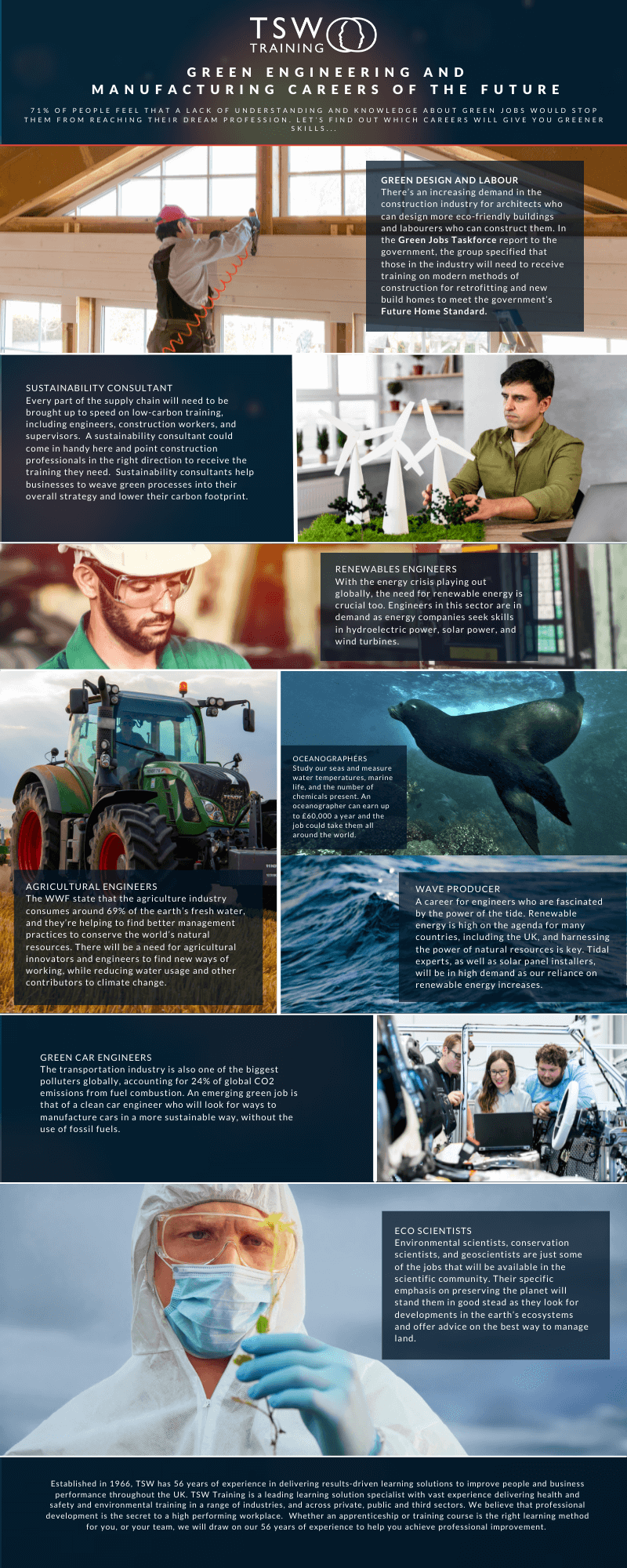As our focus on saving the planet becomes more acute, workplaces across the UK are changing to embrace new ways of sustainable working.
With more regulations coming into effect and companies starting to make their supply chains sustainable, there’s no better time to start bringing green processes into your business.
But while some industries are flying ahead, others are slower to adopt sustainable practices, putting them at risk of being left behind when it comes to going green.
Key Points
- According to research, the agricultural, manufacturing, construction and healthcare sectors have the most green-skilled workers. Energy and mining sectors are also growing at a fast rate.
- Sectors such as the arts, entertainment, and finance industries have lower amounts of employees with green skills, but this will no doubt change over the coming years.
- In the future, there will be lots of opportunities to use green skills in sectors such as construction, engineering, and agriculture, and new job roles will be created to accommodate the need for sustainably-minded workers.
Which sectors are embracing green business skills?
The World Economic Forum’s 2020 analysis showed that sectors such as energy and mining are hiring green-skilled workers at a fast rate. Green skills are soon to be essential in their industries, due to natural resources becoming more limited as time goes on.
However, overall, there are more green-skilled workers in the agricultural sector, as well as manufacturing, construction, and healthcare. It’s going to become particularly crucial for those who are part of a supply chain to make sure they’re doing all they can to be sustainable, as consumers and organisations begin to phase out partners that aren’t deemed ‘green’.
Listen to our training experts discuss how your business can become more sustainable, in our green skills podcast
Which sectors are not embracing green skills?
At the moment, sectors such as the arts, entertainment, and finance industries have lower amounts of employees with green skills, but this will no doubt change over the coming years.
In the finance industry, green issues will become more important when it comes to investing in sustainable and ethical organisations. With more people becoming savvy with their money, banks will need to focus their efforts on finding green alternatives if the companies they work with aren’t trading in sustainable ways.
Which sectors will utilise green skills most in the future?
There will be lots of career opportunities to use green skills in sectors such as construction, engineering, and agriculture, and new green job roles will be created to accommodate the need for sustainably-minded workers.
Building regulations will require the construction industry to be green-skilled at every level so that sustainable processes can be carried out end-to-end. Buildings and homes will need to meet greener standards to comply with the government’s Future Homes Standard too.
Scientists and engineers will be in high demand across various sectors as they find new ways of working for the good of the environment. Natural scientists and geoscientists will help us understand how the world is changing, while engineers adapt to working on innovative projects such as low-emissions vehicles.
The agricultural and transportation sectors will need to be overhauled to bring down carbon emissions, and green skilled workers will prove instrumental in this.
How can businesses become more adapted to green skilled workers?
Bringing workers with these abilities into your business could be hugely beneficial.
It’s good to understand where your green skilled workers will be best placed before you decide to hire them. A consultant or someone in your team could carry out a gap analysis to see where the business would benefit the most from an employee with green skills.
A green-skilled worker will be able to monitor your processes and see where the company could become more sustainable. You can then adapt your procedures to make the most of the green-skilled workers you have in your team.
It’s not enough to think that the senior leadership team can create a strategy for sustainability, and it will be implemented immediately by the rest of the workforce. As a leader, you’ll need to get everyone in your workplace on the right page when it comes to green issues and show them the impact their actions can have. It’s worth training your current staff, as well as hiring new green-skilled workers, so your entire team can understand that changes will need to take place for the company to be greener.
“Now is the time to prioritise sustainability in your business,” says Rachael Gooding, sustainability consultant and associate trainer at TSW Training. “Allow people to have the time to do training, to think differently, to change the way we view what consumers want.
“People want to purchase from a business with purpose. They want to know their purchase is doing good. There are all these drivers that will force businesses to work differently and take advantage of sustainability.”
Read more:
- How Will Gen Z Be Key To Future Sustainability Practices For Businesses?
- Equipping the new generation with green skills
However you decide to bring green skills into your business, it’s vital that you act sooner rather than later.

What courses are out there to help make your workplace greener?
IEMA courses offer staff the chance to learn more about sustainability, how it can impact your staff’s working life, and why it’s important to become a green-skilled.
Depending on the level you opt for, the course can take between one day and fifteen days, and there are courses available for all levels of the business.
Take a look at the list of the IEMA courses & training programmes we offer to help you get your team up to speed:
- IEMA Environmental Sustainability Skills For The Workforce – a one-day entry level course designed as a starting point for every worker in your business.
- IEMA Environmental Sustainability Skills For Managers – this two-day course is a strategic and operational environmental course for managers and supervisors to discover the implications of environmental sustainability.
- IEMA Foundation Certificate in Environmental Management – five-day course that is more in-depth, designed to improve your business’ resilience, productivity and mobility and most importantly, inject green skills into your workforce.
- IEMA Certificate in Environmental Management – 15 day course that is the perfect professional development qualification for those working in organisations at an operational level and pursuing a career path in environment and sustainability.
- IEMA Pathways to Net Zero – is a 2-day course, perfect for those who are taking their first step into the world of sustainability.
If you’re unsure which course is right for you, get in touch with our friendly team at TSW Training.







